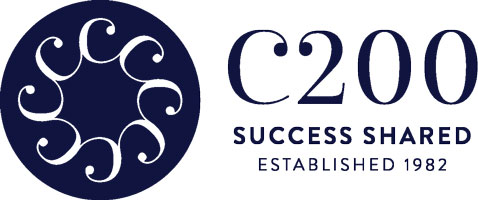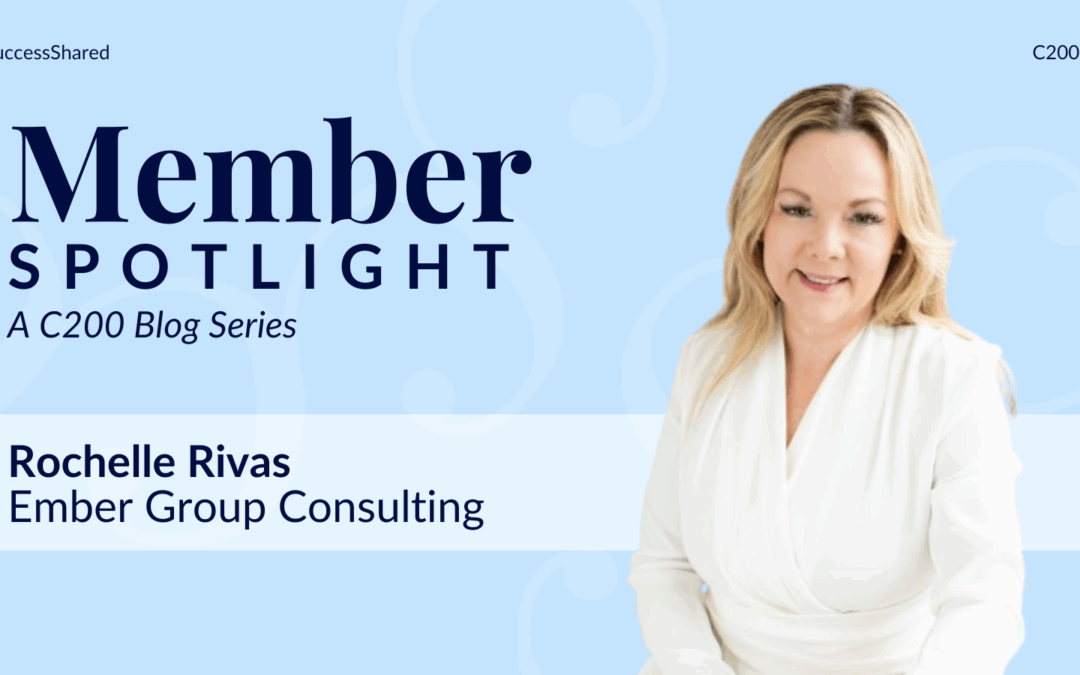Rochelle Rivas is the Co-Founder and CEO of Ember Group Consulting, a global management consulting company with hundreds of employees. A self-described “corporate refugee,” Rochelle learned early in her career that she had an entrepreneurial mindset, craving environments where she could wear multiple hats, and no two days are ever the same. She believes the key to success is mastering your inner dialogue, because your thoughts show up in your reality. Rochelle has been a Member of C200 since October 2024.
Eva Glassman: Tell me about yourself and your company.
Rochelle Rivas: I’m a mom, first and foremost. Every breath I take is for my kids; they’re identical twins, twenty-four, and my best friends. Secondly, I’m a philanthropist. Then, I’m a business leader.
I put those in that order because I believe that if you’re doing good for the community and supporting the people around you, it’s good for your business. I’ve taken that approach for the bulk of my professional career so that people around me would take a similar approach.
My company, Ember Group Consulting, is a management consulting company. This is my second company; I sold my first one, DARTON GROUP, in 2019 after eleven years. After selling DARTON GROUP and before founding Ember Group Consulting, I held an executive role at North Highland, a mid-size consulting firm. While I was there, I started to have the desire to run a business again, better and different—that’s what led me to create my current business.
It’s been about a year since we founded Ember Group Consulting, and it’s been really fun. A lot of work, but fun. Some things have been easier than the first time, and some things have been more challenging, but that’s indicative of the world we live in right now.
EG: Can you speak more to both the exciting and chaotic aspects of running your current company?
RR: I love sitting across from somebody who has a really complex issue and being able to look back at them and say, “I can help you.” There is a great sense of gratification in that. It’s also important, because our clients are primarily Fortune 500 companies. Companies are starting and stopping quicker than ever before because of the economic and geopolitical uncertainty in our world right now. Sometimes, companies need to bring in outside resources for a fresh perspective on things. Helping companies navigate these issues is something we pride ourselves on in the consulting industry.
EG: I’m curious about your career journey. What was your background at the beginning of your career? Is that in line with how your career journey went?
RR: I always thought I would wind up in an HR role, but I also didn’t want to be confined to one kind of role. At twenty-nine, I had a huge corporate job in the retail environment with tons of responsibility, but it was very mundane. Today, I call myself a corporate refugee, because I knew that being in corporate America was not my desired state.
Running my own company means some days I get to be HR advisor, some days business strategist, some days operations strategist, and so on. I landed here because I knew I didn’t want to do the same thing every day; I’m just not hardwired that way.
EG: What are the factors that led to your success today?
RR: 2008 was a very pivotal year for me, for a lot of reasons. It was a very uncertain time in the world, but also in my life. I had moved my family from Chicago and left my corporate job. It got to a point where I had so much self-doubt that I refused to let myself feel that way anymore. One day, I looked in the mirror and said, “You can do this.” And then I continued to do it each and every day, until I turned my inner dialogue from negative to positive.
I tell people this all the time; the most critical thing you can ever learn how to do is talk to yourself. The way your thoughts manifest determines your reality. If you’re doubting yourself in your head, it shows up in your life. This is so important for women to know. Your self-talk matters in so many ways, whether it’s about your physical or mental attributes.
All this to say, I believe I’m successful because I learned how to talk to myself in a very positive way, and part of that was repeating to myself things like, “You’re not giving up. You achieved this. You deserve to be here.” As I’ve gotten more mature in my career, I don’t let people influence my self-talk or make me feel like I don’t belong.
When people talk about Imposter Syndrome, I actually think that feeling comes from poor self-talk. If I walk into a room full of executives—people who are my peers—it’s a fact that I’m not an imposter. The reality is that I’m right where I belong. If I were to walk into a hospital wearing scrubs, I would be an imposter; I’m not a doctor, and I’m not trying to be.
EG: Your commitment to positive self-talk seems like such a basic thing, but you’ve made it clear that we don’t place nearly as much importance on it as we should.
RR: If you don’t do it, who will? No one else can do it but you.
It reminds me of this funny story. As I said earlier, I have identical twin daughters. When they were little, they would always fight and call each other ugly and other insults, and I would always say, “You know, you look just like each other. How can only one of you be ugly?”
EG: Can you tell me more about your journey to C200? How did you find out about us, and what made you want to join?
RR: Last year, I was invited to a private group event for board directors. Before going inside, I saw this lady walking through the parking lot—like a boss. I knew immediately that I needed to meet her. I introduced myself at the event, and we exchanged contact information and met for coffee down the line. That woman was Maryann Bruce.
As we got to know each other, she told me about C200. Maryann is an incredible ambassador for the organization. She offered to sponsor me through the application process.
EG: What a great story about our Chair Emeritus!
RR: I’ve never shared that story before! I still remember exactly what she was wearing in that parking lot. I was and still am so impressed with her—and such a fangirl.
EG: Other than emphasizing the importance of positive self-talk, what other advice do you typically share with women looking to advance their careers?
RR: When it comes to entrepreneurship, people really undervalue what it takes to succeed. I’ve actually talked many people out of starting a business. A lot of people think they can do it, but you have to ask yourself some serious questions, like: How long can you go without a paycheck? Can you put yourself or your family through that? If you find yourself with your back against the wall having to do payroll, how will you feel paying your employees before yourself? You should always be paying your employees first.
It might not be for you, or it may not be time yet. The success rate for startups is very low. I’ve had many people come back and thank me for laying out all the risks that come with it.
EG: To be an entrepreneur, you have to start with an idea. In that way, there is a large part of entrepreneurship that is idealistic. It seems like you’re bringing a very important element of realism to the discussion.
RR: To be an entrepreneur, not only do you have to be smart enough to mesh your dream with reality, but you have to be resilient enough. Resiliency is one of the key things to being successful, even beyond entrepreneurship.
I think the meaning of resiliency has become so misunderstood and overused. To be truly resilient means that you experienced an event—good or bad—and you got through it, not over it. You don’t become resilient after sitting in traffic. Resiliency is born from who you are during the event, not after.
EG: Did you have any women leaders, managers, or mentors along the way of your career journey? Who were the people who inspired you? Who did you connect with to find support?
RR: Early in my career, all my mentors were men. Later on in my career, I have found two or three women who have become my rocks when it comes to business decisions or bouncing ideas around.
When I was advancing in my career, it was my experience that women didn’t yield appropriately to other women. What I mean by that is, if it was me and another woman up for a role or promotion, someone had to yield to the other. If you’re a phenomenal leader, you’re going to yield and say, “You go for this.” I’ve yielded plenty of times in my career so that other women can get that opportunity to advance. I am a big proponent of that concept, because I believe that creates strong relationships and support networks between women in the workplace.
My hope is that younger generations will have a different experience and outlook than me. If there are enough examples around you of women rooting for each other versus being cutthroat, the better off we’re going to be for the future.
EG: I’m interested to know how you think about yourself as a “woman in business.” What does that mean to you? How does that affect the way you work and lead?
RR: In general, it’s a privilege to be in business and have a great product that people want. Being a woman in business is amazing, because we’re excellent critical thinkers who solve problems in very different ways than men.
When I speak with others about Ember Group Consulting, I talk about how our global consulting firm has hundreds of employees—and we happen to be women-owned. I’m wary of the risk of over indexing and I intentionally lead with my strengths. While being a “woman in business” or leading a “woman-owned business” is important, it doesn’t paint a full picture and can lead to others generalizing you.
EG: How do you like to spend your time outside of working?
RR: My daughters played Division One athletics all through college, which pretty much ruled our lives. Now that they are in graduate school, I find myself with much more free time on my hands.
I currently live in Charlotte, and I’ve been on a lot of amazing nonprofit boards that really drive change in our communities in issues like public health and women’s initiatives—things that are important to me.
I love spending time with friends. I love being outside—not doing anything physical but laying out on the back porch in the summer. You won’t see me hiking out in the mountains. Hands down, my absolute favorite place to be is at the beach, reading a book.
EG: Why C200? What has been your experience so far as a Member? What are you looking forward to?
RR: It’s been fantastic. There’s a level of authenticity that you find among C200 Members that I haven’t found anywhere else.
Business leaders like myself get invited to do a lot of things, and honestly, too many of those things don’t end up being worthwhile. I’ve attended plenty of webinars where afterwards, I felt like, “Well, I just lost an hour.” That isn’t the case at C200. The content and the way that leaders show up in this community has been incredibly impressive.
You get to a certain point in your career where you really have to spend your time wisely, and my time is well-spent at C200.

